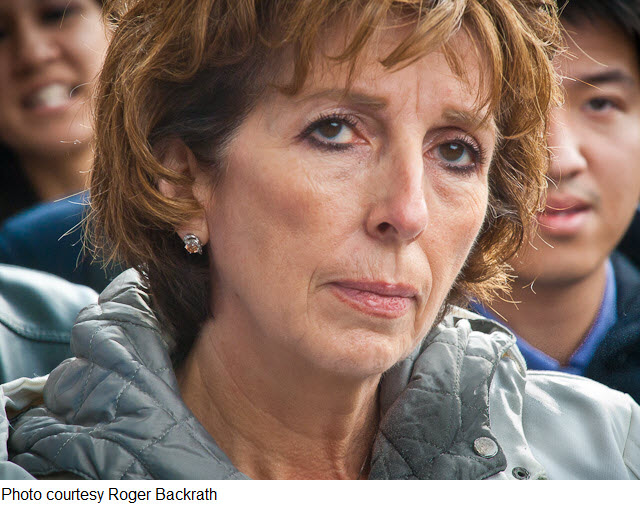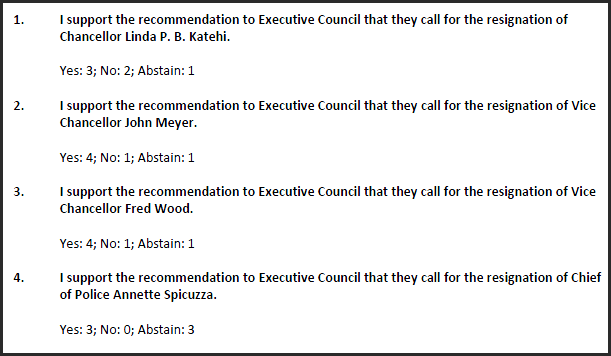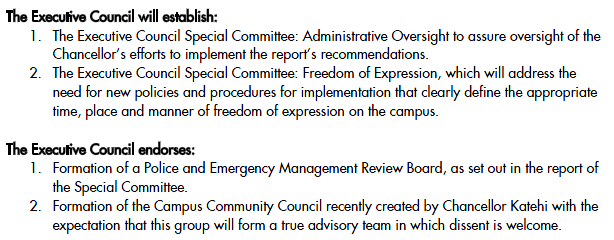 Executive Council Stops Just Short of Calling For Resignation
Executive Council Stops Just Short of Calling For Resignation
In the strongest move to date in response to the reports on the November 18 pepper-spraying incident, the UC Davis Academic Senate announced this morning, that they “hereby censure Chancellor Linda P. B. Katehi for failure to perform adequately the tasks of her office and failure to provide clarity, candor, and trustworthy accounts in relation to the events of November 18, 2011.”
The Executive Council stopped short of calling for her resignation. However, the Special Committee did do so.
They said: “The Executive Council calls upon Chancellor Katehi to provide an action plan to implement the recommendations in these reports and to address the leadership deficiencies identified therein. These include deficiencies in consultation, communication, administrative organization, and documentation.”
Executive Council requests from the Chancellor a detailed written action plan by June 1, 2012, and a progress report by October 1, 2012.
The Executive Council said it will then “evaluate the progress that has been made to restore effective campus leadership, actively consider the faculty’s confidence in the Chancellor’s leadership in light of the progress that has been made towards meaningful change, and report to the Representative Assembly.”
The Special Committee however, went much further. It was comprised of ten faculty members.
They note the work of the Reynoso Trask Force and Kroll Group, both of which “identify a systematic breakdown in campus decision-making, procedures and communication. This breakdown led senior leadership to misidentify a peaceful student protest on campus as a crisis.”
They “unanimously agree that the pepper spraying of protesters on November 18, 2011 was completely unnecessary and avoidable, regardless of the legality of the operation.”
They add, “Both reports identify many factors that contributed to this mistaken and costly misjudgment. As a committee, we are concerned with the conditions that led to the episode, and the aftermath of the incident.”
“The unacceptable treatment of our students by the administrators and the campus police, as determined by Reynoso and Kroll, represents an unreasonable use of force,” they write.
They went further in their conclusion: “Inconsistencies and gaps in statements made by the leadership team to Kroll may be the result of faulty memory or deliberate acts of omission, obfuscation or misdirection (Kroll, 58-9); the fact is, we do not know.”
They find these inconsistencies “troubling.”
They express concern over the professionalization of the administrative group, which they argue “has produced a deep divide between the administration and the rest of campus.”
They state that the committee has divided views on whether the chancellor should have to resign.
In the appendix to their report, they note “On the question of recommending specific personnel changes, the committee was deeply divided. Some members of the committee even wondered whether or not our charge extended to recommending personnel changes.”

They do agree on core principles concerning the duties of the chancellor. Those include accountability, wherein they believe the chancellor is responsible for her actions and for the actions performed under her authority, and in that the Chancellor fell short.
They write, “We are particularly concerned about the failure to take responsibility in the weeks and months that followed the incident. Such a failure disables the community from moving forward and healing. To date, the Chancellor has not truly taken full responsibility for the incident on November 18, 2011. The chancellor has on a number of occasions claimed that she has taken full responsibility for the events; however, to date she has not acknowledged the mistakes and errors of judgment that she has made as documented in Kroll and Reynoso.”
Second, they called the chancellor performance of her duties during the planning and execution of the tent clearing and other protests to be “woefully inadequate.”
Finally, they argued that, in order for the leader to function, she must have the trust of the community. Here they argued: “Chancellor Katehi’s lack of candor, consistency and clarity in the aftermath of the events has undermined the community’s trust in her leadership (Reynoso, 26- 7; Kroll, 58-9).”

The Senate vowed “to work actively and collaboratively to restore clear, effective, and respectful channels of communication and to be vigilant in assuring that goals are met and progress is sustained.”
—David M. Greenwald reporting

Please clarify: What was the Academic Senate vote calling for censure of Katehi? At the Academic Senate Executive Council vote? And the “Special Committee” vote?
Which of the three groups do the 6-person votes reflect? The quotes are from both the Executive Council and the Special Committee?
It looks like there are three levels of the organization at work here: a Special Committee, an Executive Council and Academic Senate. “How did each level’s vote turn out?” is the question I’m trying to ask.
This is what I found:
“According to the advice offered by the Academic Senate Committee on Elections, Rules and Jurisdiction (CERJ) on April 18, 2012 concerning voting rights on the committee, only Senate Faculty voted on the resolutions below, recommending action by Executive Council. All four resolutions passed.”
So I don’t know the answers to your questions. The quotes are from the Executive Council, the Special Committee appears to have voted and passed the four resolutions.
UC Davis News Service announcement, today, a little after noon:
[i]The action steps represent the university’s preliminary response to input and recommendations from a task force appointed by UC President Mark Yudof to investigate the Nov. 18 pepper spraying of students on campus. The steps, all developed in collaboration with campus stakeholders, are available at http://demonstrationreviews.ucdavis.edu/action-plan/index.html. [/i]
Seems like the administration still needs a little work on that communication thing.
Thanks, so if the “special committee” is the six-person vote (that didn’t include others on the committee ’cause four committee members weren’t “senate faculty” members, then one wonders how the “executive council” voted (in not supporting calls for “her resignation”?
Is the “executive council” a big group, and how did they vote? And, how big a margin did the Academic Senate as a whole provide on the Katehi censure question? Is every professor a member of the Academic Senate. If so, it seems like the chancellor is in big trouble if more than half of the faculty agree she should be “censured.”
It does seem the faculty would have taken a first step of allowing her to develop a plan based on the Reynoso/Kroll report [u]before[/u] censuring her.
Sigh, neutral….here’s what I got from your link:[quote]”Our apologies. The item you requested does not exist on this server or cannot be served.”[/quote]
That would appear to be the case – six person vote, but it appears there were ten members of that committee by the listing in the report.
It sounds like the executive council is a leadership group of the total academic senate.
[url]
http://academicsenate.ucdavis.edu/documents_orgchart.cfm%5B/url%5D
“Is the “executive council” a big group, and how did they vote? “
It sounded like everyone agree with everything except the recommendations for resignation. It appears from the chart I linked above that teh Executive Council is relatively small group.
“If so, it seems like the chancellor is in big trouble if more than half of the faculty agree she should be “censured.” “
It seems this is a slap on the wrist. But it was a strong statement.
Administrators are paid more for their loyalty than for their rather ordinary skill set. Katehi trusted Meyer to handle the situation. Due to his limited skill set and lack of common sense, Meyer failed. Meyer then pointed the finger of blame at Katehi. The logical step is to fire Meyer. Otherwise, on this fundamental measure of leadership, Katehi must go.
Davis Enterprise, 5/2/12: Faculty leaders censure Katehi ([url]http://www.davisenterprise.com/local-news/crime-fire-courts/faculty-leaders-censure-katehi-committee-urges-change-at-top/[/url])
The Special Committee vote was a vote of a subset of the committee and was advisory in nature. The Executive Council’s vote was separate and official. The Executive Council voted to “censure” Katehi, per the cover page of this PDF file:
http://academicsenate.ucdavis.edu/documents/Executive-Council-Motion-and-Letter-including-Nov-18.pdf
You are absolutely right Grad Student,
I agree with you,
[edit]
Maybe it’s not such a crisis of confidence of Katehi after all, after reading the stuff linked by wdf1 and Grad Student, more like putting her on notice that “we’re watching you.” Also, the Academic Senate (some 1,000 strong) doesn’t appear to have considered this, just its Executive Council (the leadership of ? folks). Still not something any chancellor would want on her resume’.
From the Enterprise: “Academic Senate Chair Linda Bisson said that by reprimanding Katehi, a member of the Senate, instead of calling for her resignation as chancellor, the Executive Council felt that it had the best chance to bring reform to the campus and UC system as a whole. ‘Our goal is to have a campus that allows this type of dissent and treats people with respect and is inclusive’, she said. ‘What it came down to is, the existing (chancellor) has pledged to do what we want to do and change things.’.”
Interesting that that this is just one of the reports out this week: “Katehi has said her administration’s plans for change will take into account both the Senate special committee’s report and a systemwide UC report on policing protests, a draft of which is due out on Friday. Shiller said much of what the committee recommended is reflected in the proposals the administration posted on Wednesday. He called it an ‘unintended convergence’ that the proposals, which address the Kroll and Reynoso reports, were placed online on the same day the Academic Senate published its report.”